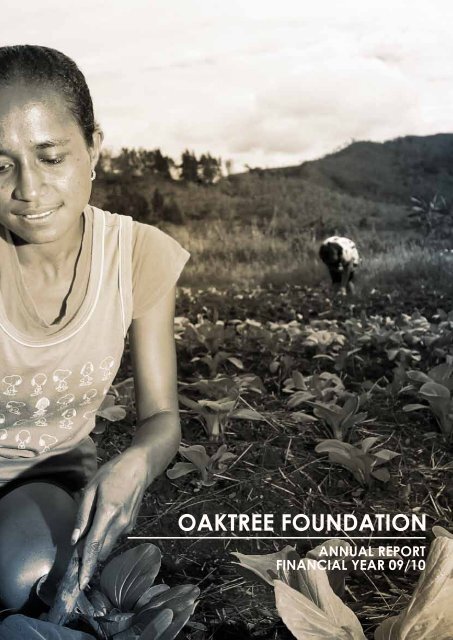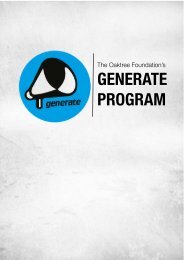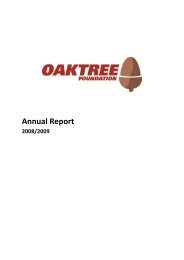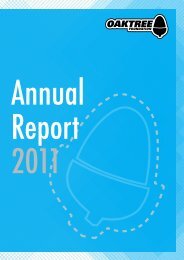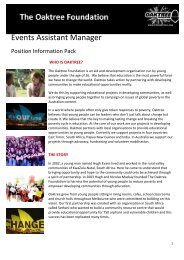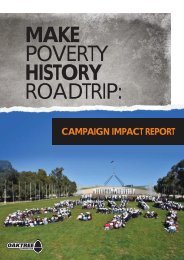Financial Year: 2009-2010 - The Oaktree Foundation
Financial Year: 2009-2010 - The Oaktree Foundation
Financial Year: 2009-2010 - The Oaktree Foundation
You also want an ePaper? Increase the reach of your titles
YUMPU automatically turns print PDFs into web optimized ePapers that Google loves.
OAKTREE FOUNDATIONANNUAL REPORTFINANCIAL YEAR 09/101
Table Of ContentsMESSAGE FROM THE CEOMESSAGE FROM THE CHAIRMAN OF THE BOARDWHO WE ARE :MISSIONVISIONSTRATEGIC GOALSCORE VALUESOUR PARTNERSHIPS OVERSEAS :A SNAPSHOT OF OUR DEVELOPMENT PHILOSOPHYOUR PROJECTS IN <strong>2010</strong>OUR GENERATION’S CHALLENGEOUR WORK IN AUSTRALIA :SCHOOLS 4 SCHOOLSGENERATECAMPAIGNSFINANCIAL INFORMATION :HOW FUNDS WERE USEDSUMMARISED FINANCIAL STATEMENTSCORPORATE GOVERNANCE :ABOUT THE BOARD OF DIRECTORSDIRECTORS’BOARD MEETINGSFUTURE FUND BOARDFUTURE FUND INVESTMENT COMMITTEE481212121314151517202121242628283134343536362 3
THIS HAS been a year of remarkable achievement for <strong>Oaktree</strong>,one in which we demonstrated the enduring power of youngpeople, and of this organization, to bring about social and politicalchange. Looking back, it was the year in which we showed that<strong>Oaktree</strong> was here to stay as a major force in the Australian socialand political landscape. <strong>The</strong> year really fell into two halves – ofplanning and organizational development in <strong>2009</strong>, and of publicimpact and project delivery in <strong>2010</strong>. In August <strong>2009</strong>, we embarkedon our most significant organizational planning process to date –the development of a three-year Strategic Plan. We refined ourmission as an organization to :We then set out four organizational goals that we wouldrelentlessly pursue over the next three years :1. Transforming 2500 young people annually into dedicated& effective agents of change.2. Investing $750,000 annually in providing quality educationalopportunities to young people in developing countries.3. Seeing Australians and our leaders take a lead in realizingthe UN Millennium Development Goals.4. Sustaining the organisation.MESSAGEFROM THE CEO<strong>The</strong>se goals, being clear, ambitious and measurable, have laidan immensely clarifying and energizing foundation for <strong>Oaktree</strong>.Even by simply creating a common language by which theorganisation defines success, they represent an enormous leapforward.message from the CEO (cont.).At <strong>Oaktree</strong>’s National Conference in December, we launched thisstrategy and cast a vision for the organization in <strong>2010</strong>. We began totalk about <strong>2010</strong> as a ‘tipping point’ year in Australia’s fight againstglobal poverty. It represented a point, five years away from thedeadlines of the UN Millennium Development Goals, when wewould either live up to the commitments we made in the year2000 or renege on our promises to the world’s poorest and mostvulnerable.This was the start of the biggest youth advocacy campaignof its kind in Australian history –the Make Poverty History RoadTrip. We recruited over 900 young people to travel from sixcapital cities to Canberra, meeting directly with over 100,000Australians and reaching out to over 10 million people throughthe media.In Canberra, we met face to face with over 150 Senators andMembers of Parliament to convey our message. Ultimately, wealso successfully passed the Act To End Poverty through bothhouses of Parliament, a symbolic commitment by Australiansand our leaders that we would see it through.Most importantly, in August of this year the Oppositionannounced that if elected, it would appoint a Minister forInternational Development. <strong>The</strong> Government also announceda range of new measures designed to improve the efficiencyand impact of Australian aid. This was a direct result of ourefforts, and it was an im mensely encouraging step towards ourgoal of making Australian aid the most effective in the world.4 5
message from the CEO (cont.).<strong>2010</strong> was also an immensely significant year for <strong>Oaktree</strong>’s work inPapua New Guinea and the establishment of our new project inCambodia. Late January saw the return of the first of eight newlytrainedteachers to Yangis, a remote Highlands community in PNGthat we first encountered three years ago. Rex Kibu was the firstteacher the school had seen in fifteen years, and he discovered acommunity hungry for education. In just the first few months, almost500 students enrolled in the primary school – ranging from 5 yearold children to 35 year old men & women who had been denied afunctional school when they were young.In April, <strong>Oaktree</strong>’s projects team visited Cambodia for the first time,travelling deep into the remote provide of Kampong Cham.We established a relationship with Kampuchean Action for aPrimary Education (KAPE), announcing a $480,000 partnership witha plan to grow three of the region’s poorest middle schools intocentres of educational excellence.This project represents some of the most cutting-edge developmentwork <strong>Oaktree</strong> has ever been involved in.This has truly been a transformative year for <strong>Oaktree</strong>; a yearof milestones which will mark the way for the organisationinto the future.‘this hastruly beena transformativeyear for <strong>Oaktree</strong>’message from the CEO (cont.).At <strong>Oaktree</strong>’s National Conference inDecember, we launched this strategy andcast a vision for the organization in <strong>2010</strong>.We began to talk about <strong>2010</strong> as a ‘tippingpoint’ year in Australia’s fight againstglobal poverty. It represented a point, fiveyears away from the deadlines of the UNMillennium Development Goals, when wewould either live up to the commitmentswe made in the year 2000 or renege on ourpromises to the world’s poorest and mostvulnerable.This was the start of the biggest youthadvocacy campaign of its kind in Australianhistory – the Make Poverty History RoadTrip. We recruited over 900 young peopleto travel from six capital cities to Canberra,meeting directly with over 100,000 Australiansand reaching out to over 10 million peoplethrough the media. In Canberra, we met faceto face with over 150 Senators and Membersof Parliament to convey our message.Ultimately, we also successfullypassed the Act To End Povertythrough both houses ofParliament,a symbolic commitment byAustralians and our leadersthat we would see it through.Mostimportantly, in August of thisyear the Opposition announcedthat if elected, it would appointa Minister for InternationalDevelopment. <strong>The</strong> Governmentalso announced a range of newmeasures designed to improvethe efficiency and impact ofAustralian aid. This was a directresult of our efforts, and it wasan immensely encouraging steptowards our goal of makingAustralian aid the most effectivein the world......................................6 7
MESSAGE FROMTHE CHAIRMAN OF THE BOARDSINCE its foundation, <strong>Oaktree</strong> has continued to provide a platformfor it’s participants to bring together a diverse range of talents andskills combined with unbridled passion and enthusiasm with thecommon purpose of young Australians committing themselves toenabling real and positive change in the lives of the world’s poor.Over the past twelve months, under the clear and visionaryleadership of our CEO, Tom O’Connor, supported by an amazinggroup of talented and deeply committed leaders representingthe Executive Leadership Team, <strong>Oaktree</strong> has focussed it’s effortsin working towards the fulfilment of our three year strategic planestablished in <strong>2009</strong>.<strong>The</strong> measurement of success of <strong>Oaktree</strong> can be demonstrated inmany ways and is underpinned by the efforts and drive of eachvolunteer who serves the organisation.Our goal to support and invest in quality educational projects indeveloping communities has been fulfilled in the continued financialcontribution to our project partner’s GOLD Peer Education Programin South Africa which has been supported by the dedicated workof <strong>Oaktree</strong> volunteers living in South Africa. In addition, we havefunded educational projects in Papua New Guinea and East Timorand the initiative to commence support for a new project beingdelivered in Cambodia represents some of <strong>Oaktree</strong>’s significantachievements this year.<strong>Oaktree</strong>’s goal to transform young Australians to becomededicated and effective agents of change was given a hugeboost this year through the delivery of the Make Poverty History<strong>2010</strong> Road Trip which saw 1,000 young Australians significantlyengaged in raising Australia’s foreign aid commitment andeffectiveness. Also the continued success of <strong>Oaktree</strong>’sTransformational Engagement Programs through Schools 4Schools and Generate continued to provide an avenue forlearning for Australia’s young people with respect to how theycan respond to the issues relating to global poverty.message from the chairman of the board (cont.).Through the establishment of the <strong>Oaktree</strong> Future Fund in 2008,<strong>Oaktree</strong> is seeking to create a strong foundation andinfrastructure to enable it’s sustainability and security forthe years ahead.<strong>The</strong> Future Fund is well served by a dedicated Advisory Boardwhich represent key business, education and community leaderstogether with <strong>Oaktree</strong> volunteers. <strong>The</strong>se volunteers have workedtirelessly through the means of Vision Dinners and one on onemeetings to promote and engage with our current and potentialsupporter base. Our Future Fund Gala Event to be held in October<strong>2010</strong> should see our Future Fund base climb to in excess ofone million dollars. We are also excited that former Prime Ministerof Australia, <strong>The</strong> Right Honourable Malcolm Fraser AC CH, thisyear has become the Patron of the <strong>Oaktree</strong> <strong>Foundation</strong> and willbe our special guest at the Gala Event.During the past year, the <strong>Oaktree</strong> Board has seen much changein it’s non-executive membership. Our Founding Chair, Jo Knight,stepped down at the end of <strong>2009</strong> after seven years of dedicatedand highly effective leadership of the Board. Meg Brodie, whohas served <strong>Oaktree</strong> with such dedication and passion both asa volunteer and a Board member resigned from her position asCompany Secretary to take up a position in Sweden in HumanRights Law. Both Jo and Meg have been outstanding in theircommitment and care for <strong>Oaktree</strong> since it’s inception and bothcan be attributed with having positively impacted <strong>Oaktree</strong> in somany ways which will provide a lasting legacy.Geoff Buchanan, who diligently served as <strong>Oaktree</strong>’s Treasurer onthe Board for the past three years, has also stepped down thisyear and we are most grateful for his enormous contribution andwisdom during his service to <strong>Oaktree</strong>.8 9
message from the chairman of the board (cont.).A professional review of the Board and it’s operations wasconducted last year and the Board has been working diligently toaddress some of the key outcomes from the review. One of theoutcomes was to ensure that a diverse range of skills, experienceand networks were represented on the Board to enable ourgovernance and support role for <strong>Oaktree</strong> and it’s leadership tobe best delivered.In response to this, along with my appointment to the Board in therole of Chair in December <strong>2009</strong>, Martine Wilson, John Nolan andLouise Mercer were appointed this year and together bring to theBoard a broad range of experience and expertise in the areas of<strong>Financial</strong> Management, Business Development, BoardManagement and Governance, Overseas Aid and Development,Marketing and Business Growth and Human ResourceManagement and Development. <strong>The</strong>se non-executive Boardmembers together with Viv Benjamin, Glen Berman,Andrew Asten and Tom O’Connor, who represent <strong>Oaktree</strong>’sleadership team on the Board, are working with greatcommitment and diligence to ensure that <strong>Oaktree</strong> continues toflourish and meet it’s objectives.As Chair of <strong>Oaktree</strong>, I am both privileged and humbled tobe working alongside some of Australia’s most talented andequipped young people who demonstrate their sincere andheartfelt commitment to the poor through countless hours of selflessservice. May I thank each and every one of them forall they do and for the example they provide, I would also like ourwonderful supporters, donors, mentors, corporate sponsors andpro-bono partners for assisting <strong>Oaktree</strong> to fulfil it’s vision.young peopleworking togetherto endglobalpovertyAs you read this report which reviews <strong>Oaktree</strong>’s activities andachievements for <strong>2009</strong>/<strong>2010</strong>, may you be encouraged by theoutcomes accomplished by working together as a communityand may each of us be challenged to continue to remainresolute and focussed on bringing an end to the injusticesthat exist in our world.10 11
WHOWE AREMISSION .......................................................YOUNG PEOPLE WORKING TOGETHER TOEND GLOBAL POVERTYSTRATEGIC GOALS .................................BY 2013 WE WILL :Invest $750,000 each year in projects to support qualityeducational opportunities for youngpeople in the developing world;Invest in 2,500 young people each year to be dedicated andeffective agents of change;See Australians and our decision makers take the leadon the realisation of the millenium developmentgoals, andSustain the organisation.VISION .........................................................*<strong>The</strong>se goals are broken down into 13 key performance indicators and 30 annual targets.A complete copy of the strategic plan is available on the <strong>Oaktree</strong> website.WE BELIEVE EDUCATION IS THE MOST POWERFUL TOOLWE HAVE TO END GLOBAL POVERTYWE PARTNER WITH DEVELOPING COMMUNITIES TO SUPPORTQUALITY EDUCATIONAL OPPORTUNITIES FOR YOUNG PEOPLEWE INVEST IN YOUNG PEOPLE AT HOME TO BE DEDICATEDAND EFFECTIVE AGENTS OF CHANGEWE LEAD A GROWING GRASSROOTS MOVEMENTFOR SYSTEMATIC CHANGE12 13
CORE VALUES ..........................................OUR OVERSEAS PARTNERSHIPS<strong>The</strong> <strong>Oaktree</strong> <strong>Foundation</strong> is a Christian organisation thATwelcomes people of all faiths or no faith, who share<strong>Oaktree</strong>’s core values, to join with us in achieving ourmission. Whilst the motivations of those at <strong>Oaktree</strong> andthe reasons why we share these core values may differ,we are united behind a common mission.Our work is guided by:IN <strong>2010</strong> <strong>Oaktree</strong> has made significant progress towardsimproving the quality, and credibility, of our overseasdevelopment work. At the beginning of the year weundertook an important review of our development philosophy,and through a process of extensive consultationwe arrived at a set of principles to better guide andinform our international development work. Our newphilosophy gives us the coherency we need to effectivelycommunicate our project work, and provides aninvaluable framework by which to select new projects.Commitment to the poor<strong>The</strong> existence of poverty is our core motivating force, and we strive toput a wholehearted commitment to the global poor at the centre ofour decision-making.PartnershipIn working to end global poverty, we see ourselves as part of a broader movementand choose to act in partnership with other organisations to achieveour mission.Return on investmentWe pursue activities that will provide the highest social return on the resourceswe invest.AccountabilityWe seek the highest levels of accountability to the public and to ourstakeholders for the delivery of our projects and programs.<strong>The</strong> unique ability of young peopleWe believe that young people can be unique agents of social change, and havegreat untapped potential in the fight against global poverty.EducationWe believe that education is fundamental in empowering people and breakingthe poverty cycle.14 15A SNAPSHOT OFOUR DEVELOPMENT PHILOSOPHYAS of <strong>2010</strong>, <strong>Oaktree</strong> plans to focus our development work inthe poorest countries in South-East Asia and the Pacific. Thiswas the most significant decision taken during the reviewprocess, particularly given <strong>Oaktree</strong>’s history of working inSouth Africa. However, we agreed that a regional focus wouldenable us to spend our limited resources more efficiently andeffectively, leverage greater public and government support,and engage in a meaningful way more regularly with ourproject communities.<strong>Oaktree</strong> will continue to support our longstanding project inSouth Africa, GOLD, until the end of 2012.Within our new Asia-Pacific focus, <strong>Oaktree</strong> will continue topartner with in-country organisations that recognize andsupport the value of young people. In taking this approach,we aim to enable our peers in the developing world tofurther build leadership and resilience so that they can bringchange to their own communities. Consequently, it is througheducation projects that <strong>Oaktree</strong> will continue to equip youngpeople with the skills and knowledge to take control of theirlives and make positive choices.
a snapshot of our developmental philosophy (cont.).Finally, <strong>Oaktree</strong> will continue to identify and supportprojects that not only provide short-term benefit butare also capable of being upheld by the communitylong after we are gone. In this way we will ensure thatthe outcomes of the project are sustainable and notcontingent on our involvement. To create the necessarysense of community ownership, <strong>Oaktree</strong> will partner withprojects that make a conscious effort to strengthen thecapacity of developing communities and individuals sothat they can take charge of their own lives.This process of revising our development philosophy is anexciting milestone for <strong>Oaktree</strong> as we seek to become anincreasingly credible and effective aid and developmentorganization. It speaks to our growing maturity that we areable to recognize the limitations we face with a relativelysmall budget in the sector as a whole. At the same time,it carves out a strong niche for <strong>Oaktree</strong>’s developmentwork, and taps into the enormous goodwill and networksthat exist for our work in connecting young Australians toour region.PROJECTSIN <strong>2010</strong>A SCHOOL REOPENED INPAPUA NEW GUINEAAT the beginning of <strong>2010</strong> <strong>Oaktree</strong> reopened a school in a remotecommunity called Yangis, in the highlands of PNG. This momenthas been in the making since 2007 when <strong>Oaktree</strong> sent 8 localpeople to teaching college in Madang – a local solution to theshortage of government teachers in Yangis due to cultural, andgeographical isolation. <strong>The</strong> first lot of the teachers returnedto Yangis this year to open the school which has been closedfor the past 15 years. 500 students turned up at the school,demonstrating the hunger for education and knowledge in thisremote place.A group of <strong>Oaktree</strong> volunteers recently returned to Yangis tofind the school up and running, with two new bush classroomsbuilt by the community to service the demand, and even someof the adults getting involved as teachers aids. Still only in itsfirst year, the school has generated dramatic improvementsin health and hygiene through educating students aroundthese issues, and the previously warring 14 clans of Yangis havejoined together on the School Management Board and agreedto peace in order to attract further services to Yangis. We haveseen some incredible outcomes in <strong>2010</strong>, and are excited forthe return of the remaining teachers in early 2011!16 17
LOCAL BUSINESS THRIVINGIN AILEU, TIMOR-LESTESINCE the beginning of <strong>2009</strong> <strong>Oaktree</strong> has been partnered withPlan Timor-Leste on a Youth Livelihoods Project in Aileu, one ofthe 14 districts of Timor. Over the course of the last 18 monthsall the 200 young people involved in the project have receivedthe training and necessary materials to start to implement theirown small businesses.Business skills training has been delivered by the Ministry ofEconomic Development; and technical training on animalhusbandry, fish farming and horticulture has been delivered bythe ministry of Agriculture. All of this has begun to pay off andwe have small businesses springing up all over the place,ranging from building chicken houses, to horticulture and fishponds. We have also seen a Women’s Vocational EducationProgram be implemented to respond to the challenges inattracting women to the mainstream program.GOLD project (cont.).who have finished school to continue with Gold and be trainedup as a facilitator to ultimately go out into schools and provideother young people with the transformational experience theythemselves had with Gold. It has been really exciting to supportthis new aspect of the Gold program particularly given thatthe Track 4s also provide <strong>Oaktree</strong> with a sustainable and localway to collect brilliant information and stories from the Goldprogram for us to then share back here in Australia. <strong>The</strong> GoldProgram continues to provide young South Africans with acritical educational experience, with 91% of school principalsin late <strong>2009</strong> reporting positive changes in peers as a result ofthe program, and 95% reporting a perceived increase in thelevel of knowledge about HIV/Aids amongst youth.Finally, we have made a decision to extend the completiondate of this project from December <strong>2010</strong> to July 2011. Thisdecision aims to accommodate our partner Plan, and theneed to ensure that the outcomes are sustainable beyond ourinvolvement in Aileu.<strong>The</strong> RPD Team are about to embark on a trip to Timor to do ourannual evaluation of the project so stay tuned!FINDING GOLDIN SOUTH AFRICAOAKTREE’S most longstanding development project is our HIV/Aids Peer Education Project in KwaZulu Natal and Mpumulunga,South Africa. Over the last year <strong>Oaktree</strong> has enabled the Goldprogram to be implemented in 19 schools across these tworegions. In particular, we have seen the implementation of theTrack 4 program which enables thoseAbove: the GOLD project in action.A NEW PROJECTIN CAMBODIA!IT IS with great excitement that <strong>Oaktree</strong> welcomes a newproject into the fold in <strong>2010</strong>. Our decision to focus our work inSouth-East Asia required identifying a new project in the region.After careful consideration, three countries were short-listed:Cambodia, Timor-Leste and Papua New Guinea. PTO18 19
a new project in Cambodia (cont.).Given it’s high youth population, clear need for educationalopportunity and the powerful narrative of a young nation stillrecovering from the oppressive and destructive regime of theKhmer Rouge, it was ultimately decided that our country focuswould be Cambodia.Following a project selection process run in Cambodia, wedecided to partner with Kampuchean Action for PrimaryEducation (KAPE), a local Cambodian NGO with an outstandingreputation in the education sector. KAPE will implement theBeacon Schools Initiative, within 3 public schools in the poorestprovinces of Cambodia, completely overhauling schooloperation, management and curriculum over the course of fouryears. <strong>The</strong> most exciting element of of this project is a schoolmanagement model based on public-private partnerships. Thiswill ensure a higher standard of accountability, transparencyand overall quality.It is estimated these ‘Beacon schools’ will help at least 1,350students directly, as well as the indirect beneficiaries such asteaching staff, student families and the school community. <strong>The</strong>innovative nature of this project recently caused the RPD Teamto be invited to AusAid in Canberra to share with them thepracticalities of this project – and they were extremely impressed!OUR GENERATIONS CHALLENGETHE 5th year of the annual Our Generation’s Challenge (OGC)fieldtrip has seen many successes in the last 12 months. Runacross July, the FY was kicked off with ten volunteers from acrossthe country meeting in Darwin for a solid three days of issuestraining before jumping on a flight to Dili. <strong>The</strong> team spent threeweeks travelling through East Timor and Papua New Guinea:connecting with youth networks, development practitioners,government department, local organisations andinternational agencies.<strong>The</strong> <strong>2009</strong> trip created a new direction for OGC – being the first ofits kind to visit one of <strong>Oaktree</strong>’s projects on the ground; Plan TimorLeste. <strong>The</strong> team also spent four days in Port Moresby witha new project in Cambodia (cont.).Youth Organisation ‘<strong>The</strong> Voice’, running organisational skillssharing workshops and gainingan insight into grassrootscampaigning and youth activism in the pacific. This was aparticularly powerful experience for volunteers from both<strong>Oaktree</strong> and <strong>The</strong> Voice, and prompted a new understandingof the strength of friendships and collaboration with youngpeople across our region, and a strong desire to extend this toall the arms of <strong>Oaktree</strong>’s work within Australia.Building on the success of the <strong>2009</strong> trip, the <strong>2010</strong> OGC team willreturn to PNG and then visit the Solomon Islands. This allows theteam to visit <strong>Oaktree</strong>’s partner project in the remote highlandcommunity of Yangis, PNG, and return to Port Moresby todevelop our partnership with <strong>The</strong> Voice while also fostering newfriendships with youth networks and development circles in theSolomons and across our region.OUR WORKIN AUSTRALIASCHOOLS 4 SCHOOLSOAKTREE’S Schools4Schools program partners Australian schoolswith schools in South Africa, to support the Gold program.<strong>2009</strong>-10 for Schools4Schools was characterised by a periodof consolidation. In <strong>2009</strong> we saw a National Schools4Schoolsprogram rolled out in over 40 schools.. In late <strong>2009</strong> theSchools4Schools team undertook a thorough evaluation andreview of the program making some key strategic decisions onthe implementation of the program for <strong>2010</strong>.20 21
schools for schools (cont.).This review resulted in the focus on 4 key components of theprogram:- A dedicated mentor in every school;- A Schools4Schools Conference in each state to engagestudents with the issue of global poverty;- Fundraising initiatives run by students, with the support of theirmentor, to support their partner school; and- Global Education Month to enable students to teach theirpeers about different aspects of global poverty.LOOKING AHEAD<strong>2010</strong>-11 PROMISES to be an exciting with year, as we explorenew ways to engage with schools in Australia, enabling theprogram to run in at least 60 schools across the country. Thiswill allow an increasing number of regionalschools to participatein conferences, book speaking engagements andparticipate in our Live Below the Line campaign. This will bean exciting opportunity to reorientate the program to SouthEast Asia and our new partnership with KAPE in Cambodia.<strong>2010</strong> saw the program run in 40 schools, engaging over 1,000young people over the course of the year.KEY SUCCESSES <strong>2009</strong>/10- RUNNING successful state conferences in ACT, NSW, QLD, SA,VIC, WA and engaging over 1,000 young people throughoutthe Schools4Schools program.- Having high quality communication materials delivered fromthe team in South Africa to engage students with the issuesthat face the youth of South Africa.- Facilitating the GOLD Speaking Tour – Schools4Schools flew PKa GOLD facilitator to Australia for a three week speaking tourof Schools4Schools schools. PK presented to 20 of our schoolsand at the Western Australian Schools Conference. Studentswere excited to meet an inspiring young South African whowas able to passionately explain the challenges that face theyouth of South Africa.- Fundraising over 100,000 through schools engagement in 09/10.22 23
GENERATE<strong>2010</strong> HAS marked a new era for the <strong>Oaktree</strong> <strong>Foundation</strong>’s entrylevel volunteering program for tertiary students, Generate.For the first time, Generate managers worked closely with theNational Generate team and flew twice annually to Melbourneto design a universal curriculum.172 Generators were selected from over 500 applications inMarch. Generate management teams in Adelaide, Canberra,Melbourne, Perth and Sydney worked to consolidate and sharelearnings about the Generate experience nation-wide.KEY SUCCESSES <strong>2009</strong>/10- ALL states smashed the fundraising target for the first half of<strong>2010</strong>.- <strong>The</strong> number of participants in the program grew significantlyacross <strong>2009</strong> and <strong>2010</strong>.- Training workshops for managers in February and Juneenabled <strong>Oaktree</strong> to invest in volunteers, and ensure the qualityof the program across the country.- ‘Global Changers’, an adaptation of Generate able to beintegrated into a university’s curriculum, was developed andimplemented at Monash University.generate (cont.)LOOKING AHEADGENERATE will run simultaneously in 7 capital cities acrossAustralia in 2011. Over 250 young people will becomededicated and effective agents of change over a 7 monthperiod. <strong>The</strong> team implementing this will number 7 GenerateManagers, approximately 25 facilitators, and 10 core nationalteam members. In addition Global Changers will become the8th Generate program. <strong>The</strong> program will align Generate’sstrategic goals to enable active integration within <strong>Oaktree</strong>.We see this business model as the future of Generate expansionnation-wide.Generators will participate in grass-root campaigning and raiseover $100 000 for our projects overseas. <strong>The</strong>y will be linkedonline to a wider <strong>Oaktree</strong> community of Generators andvolunteers alike. Perhaps most critically they will be connectedto our cause and sustain the organisation in assuming the rolesof facilitators and managers in future years.24 25
CAMPAIGNS<strong>2009</strong>-10 HAS been a busy and exciting year for <strong>Oaktree</strong>’scampaigns, focussing on raising public and political awarenessof extreme poverty and the importance of achieving theMillennium Development Goals.<strong>The</strong> year started with Stand Up for Change, a 6 week campaignthat empowered young people to take grassroots action toend extreme poverty. Each week, campaigners were trained inand carried out a different medium of grassroots campaigning.This included collecting video petitions, fundraising, visitingMembers of Parliament and working with the media. <strong>The</strong>campaign culminated with events held in every state to markStand Up day, joining with others around Australia and theworld to stand up against extreme poverty and demand actionfrom our government.This was instrumental in building momentum around thehighlight of the year, the Make Poverty History Roadtrip. Over7 days, 1,000 young people travelled on 9 different roadtripsacross the country, mobilising unprecedented community andpolitical support. <strong>The</strong> roadtrips met in Canberra, where the MakePoverty History Summit took place from the 12th - 14th of May.<strong>The</strong> 1,000 Roadtrip ambassadors came from a broad spectrumof Australia’s youth population, collectively representingevery federal electorate in the country. <strong>The</strong> Roadtrip focussedaround the need for Australia to give more aid, better aid andto take global leadership on development. Over the week ofthe campaign, Roadtrip ambassadors raised awareness ofthe Millennium Development Goals by organising events andactivities in support of the key asks of the campaign.campaigns (cont.).<strong>The</strong> Roadtrip ended in a two day Make Poverty History Summit inCanberra. During the summit ambassadors heard from a rangeof outstanding speakers, met with 143 Members of Parliamentand Senators and consulted with the Australian Youth Forum onhow Australia can show leadership in achieving the MillenniumDevelopment Goals.Over the course of the week, ambassadors had over 100,000face-to-face interactions. <strong>The</strong> Roadtrip was covered in everymajor Australian newspaper, hundreds of local newspapers,and every major television network, reaching 12,804,970readers and 4,236,322 television viewers and radio listeners,and millions more through social media. Overall, the Roadtripwas a resounding success.Looking ahead, <strong>Oaktree</strong>’s campaigns will continue to buildpublic and political momentum around the movement to endextreme poverty during the coming year. An exciting newannual campaign of Live Below the Line will launch in August,which has already received huge public interest. We will alsojoin with other members of the Make Poverty History coalitionto campaign around the Australian Federal Election, theGlobal Health Summit in Melbourne and the UN’s MillenniumDevelopment Goal Summit in New York.One of the primary activities during the Roadtrip was thecollection of signatures in support of the Act to End Poverty,a petition calling on the Australian Government to reaffirm itscommitment to achieving the Millennium Development Goals.Over 47,000 people signed the Act in lead up to and during theRoadtrip, which resulted in it being passed through both theHouse of Representatives and the Senate. Ambassadors alsotook part in door knocking, electoral forums and flash mobs.26 27
FINANCIALINFORMATIONHOW FUNDSWERE USED 09/10......................................65%35%HOW FUNDS WERE USEDfor the year ending June 30th <strong>2010</strong>.Total program costsFunds distributed to projectpartners overseas33% Distributions to Projects including Youth LivelihoodsTimor Leste; Yangis Community School Papua NewGuinea; GOLD South Africa; Beacon Schools InitiativeCambodia.Community Education 32% Roadtrip Expenses including venue hire; catering;advertising; conference fees; security.Total overhead costsAdministration 35% Accountancy & Bookkeeping Fees; Advertising; BankCharges; Catering; Computer Expenses; Conferences;Depreciation; Donations; Hire of Plant and Equipment;Insurance; Legal Costs; Light & Power; Motor VehicleExpenses; Postage; Printing and Stationary;Professional Fees; Project Fees; Rent; Repairs andMaintenance; Schools 4 Schools Expenses; SecurityCosts; Staff Amenities; Staff Training & Welfare; SundryExpenses; Telephone & Internet; Travelling Expenses;Volunteer Stipends.HISTORICAL COMPARISON:HOW FUNDS WERE SPENT......................................_ OVERSEAS PROJECTS & COMMUNITY EDUCATION_ ADMINISTRATIONx _ OVERSEAS PROJECTS AND COMMUNITY EDUCATIONy _ ADMINISTRATION28 29
HOW DONATIONSWERE SPENT 09/10WHERE DOES A $1 DONATION GO??During the <strong>2009</strong>-<strong>2010</strong> financial year, <strong>Oaktree</strong>received $646,923.76 in donations. Of this $646,923.76:- 0 cents of every dollar was spent on overhead costs (administrative andfundraising fees);- 100 cents of every dollar was spent on program costs. This comprises of77 cents sent to our partner projects overseas, and 23 cents spent oncommunity education projects within Australia.SUMMARISED FINANCIAL STATEMENTSIncome statement for year ending 30th June <strong>2010</strong>.REVENUERevenue from operating activities 1,322,984 999,283<strong>2010</strong>$Revenue from non-operating activities 28,434__________<strong>2009</strong>$93,434__________Total revenue from ordinary activities 1,351,418 1,351,41823%..............................................HOW DONATIONSWERE SPENT 09/1077%EXPENSESEmployee expenses (93,023) (88,086)Depreciation expense (8,043) (10,638)Project expenses (492,649) (261,869)Other expenses from ordinary activities (673,202)__________Total expenses from ordinary activities (1,266,917)__________(479,611)__________(840,204)__________Net Profit/(Loss) from ordinary activities84,502252,513Abnormal items79,147--Retained earnings from the beginning of the financial year555,239302,726..............................................Retained earnings at the end of the financial year__________718,888____________________555,239__________PROGRAM COSTS30 31
BALANCE SHEETfor year ending 30th June <strong>2010</strong>.ASSETSCURRENT ASSETSCash and cash equivalents 423,559 413,067Trade and other receivables 54,198 37,800Inventories -- 4,374TOTAL CURRENT ASSETS 477,757 442,105<strong>2010</strong>$<strong>2009</strong>$CASH FLOW STATEMENTfor year ending 30th June <strong>2010</strong>.CASH FLOWS FROM OPERATING ACTIVITIESReceipts from donors and fundraising eventsDividend received<strong>2010</strong>$1,271,476736<strong>2009</strong>$862,957Interest received 7,955 17,589General administration expenses and direct expenses (1,258,875) (886,285)NET CASH PROVIDED BY OPERATING ACTIVITIES 3,910 (5,739)--NON-CURRENT ASSETS<strong>Financial</strong> assets t 232,774 202,131Property, plant and equipment 21,915 23,336TOTAL NON-CURRENT ASSETS 254,689 225,467CASH FLOWS FROM INVESTING ACTIVITIESPayments for plant and equipment 6,583 (6,614)NET CASH PROVIDED BY (USED IN) INVESTING ACTIVITIES 6,583 (6,164)TOTAL ASSETS 732,446 680,708LIABILITIESCURRENT LIABILITIESTrade and other payablesProvisions4,713(3,210)113,414--CASH FLOWS FROM FINANCING ACTIVITIESNET CASH PROVIDED BY (USED IN) FINANCING ACTIVITIES - -Net increase in cash held (10,493) (11,903)Cash at beginning of financial year 413,067 424,970Cash at end of financial year 423,560 413,067Other current liabilities12,055 12,055TOTAL CURRENT LIABILITIES 13,558 125,469TOTAL LIABILITIES 13,558 125,469NET ASSETS 718,888 555,239EQUITYRetained earnings 718,888 555,239TOTAL EQUITY 718,888 555,23932 33
CORPORATEGOVERNANCEMartine WilsonDirector since 17 Dec<strong>2009</strong>about the board of directors lawyer.(cont.)Glen BermanDirector since 18 Feb <strong>2010</strong>John NolanDirector since 22 Jun <strong>2010</strong>.Geoff BuchananDirector since 2006Resigned 7 Dec <strong>2009</strong>Martine works in theinternational projectsteam for aid anddevelopmentorganisation, TEARAustralia. Martinepreviously worked as aGlen Berman is <strong>Oaktree</strong>’sChief <strong>Financial</strong> Officer.John owns NolanConsulting, anenvironmental andsustainability consultancy.Geoff is the Director ofCorporate BusinessBrokers.General MemberNon-executiveGeneral MemberGeneral MemberNon-executiveFinance DirectorNon-executiveLLB (Hons)/ BCom/ Dip. inModern Languages(Mandarin)Studying BA/ LLBB.Eng, M.Eng. Sci., Dip. EdLLB / BComSimon MossDirector since 2006Resigned 22 Oct <strong>2010</strong>Simon is a former keyoperational volunteer.General MemberNon-executiveBA, Masters ofDevelopment.ABOUT THE BOARD OF DIRECTORSRichard Daniel AdamsDirector since 2008Resigned 22 Oct <strong>2010</strong>Daniel is a former keyoperational volunteer.General MemberNon-executiveN/ADirector Experience Repsonsibilities QualificationsGlenn ScottDirector since 17 Dec<strong>2009</strong>Glenn is an accountant,former business owner ofPrime Charter and longterm <strong>Oaktree</strong> supporter.Office holder: ChairNon-executiveFuture FundBCom, CPAJoanne KnightDirector since 2003Resigned 17 Dec <strong>2009</strong>Megan BrodieDirector since 2005Resigned 4 July <strong>2010</strong>Tom O’ConnorDirector since 2008Andrew AstenDirector since 2008Vivien BenjaminDirector since 2008Martine WilsonDirector since 17 Dec<strong>2009</strong>Glen BermanDirector since 18 Feb <strong>2010</strong>John NolanDirector since 22 Jun <strong>2010</strong>Geoff BuchananDirector since 2006Resigned 7 Dec <strong>2009</strong>Joanne is a migrationlawyer and has beenChair since <strong>Oaktree</strong>’sinception.Megan is a lawyer and asof October 2008commenced a PhD inlaw.Tom O’Connor is<strong>Oaktree</strong>’s Chief ExecutiveOfficer.Andrew Asten is a keyoperational volunteer.Vivien Benjamin is aformer key operationalvolunteer.Martine works in theinternational projectsteam for aid anddevelopmentorganisation, TEARAustralia. Martinepreviously worked as alawyer.Glen Berman is <strong>Oaktree</strong>’sChief <strong>Financial</strong> Officer.John owns NolanConsulting, anenvironmental andsustainability consultancy.Geoff is the Director ofCorporate BusinessBrokers.Office holder: ChairNon-executiveOffice holder: CompanySecretary (and Director)Non-executiveGeneral MemberGeneral MemberFuture FundGeneral MemberNon-executiveGeneral MemberNon-executiveGeneral MemberGeneral MemberNon-executiveFinance DirectorNon-executiveBA (Hons) / LLB (Hons)BA (Hons) / LLB (Hons)Studying BA/ LLBStudying BCom/ LLBStudying BA/ LLBLLB (Hons)/ BCom/ Dip. inModern Languages(Mandarin)Studying BA/ LLBB.Eng, M.Eng. Sci., Dip. EdLLB / BCom34 35Company SecretaryMegan Elizabeth Brodie, BA (Hons) / LLB (Hons)Megan is a lawyer and as of October 2008 commenced a PhD in law. She resigned 4July <strong>2010</strong>, and this annual report has been prepared from records by Louise MichelleMercer, BCom (Liberal Studies), MBA.DIRECTORS’ BOARD MEETINGSDirector Meetings eligible to attend Meetings attendedGlenn Scott 8 7Joanne Knight 7 6Megan Brodie 14 14Tom O’Connor 14 14Andrew Asten 13 13Vivien Benjamin 14 14Martine Wilson 8 6Glen Berman 6 6John Nolan 1 1Geoff Buchanan 6 5Simon Moss 3 0Richard Daniel Adams 3 2Simon MossDirector since 2006Resigned 22 Oct <strong>2010</strong>Simon is a former keyoperational volunteer.General MemberNon-executiveBA, Masters ofDevelopment.
FUTURE FUND ADVISORY BOARDTHE Future Fund is a $3 million fund that <strong>Oaktree</strong> is establishing to ensure thefoundation’s sustainability into the future.<strong>The</strong> Future Fund Advisory Board is a sub-committee of the <strong>Oaktree</strong> Board convenedto provide specific input to the establishment of the <strong>Oaktree</strong> Future Fund.<strong>The</strong> Advisory Board now meets quarterly to provide ongoing input, support, advice,and governance for the <strong>Oaktree</strong> Future Fund.Ongoing Advisory Board Membersduring the <strong>2009</strong>-10 yearAdvisory Board MemberMurray BairdKen CromptonHugh EvansRebekah HomeElisha LondonChris MalkinGlenn ScottGeorge VicinoPrincipal, Moores LegalFormer CEO, Sir General John Monash <strong>Foundation</strong>Founder, <strong>The</strong> <strong>Oaktree</strong> <strong>Foundation</strong>CEO, MySpaceFounder, <strong>The</strong> <strong>Oaktree</strong> Future FundPrincipal, WHK HorwarthFormer Managing Director, Prime CharterChair of the Board of the <strong>Oaktree</strong> FoundaitonManaging Director, SYPAQAppointment of Advisory BoardMembers during the <strong>2009</strong>-10 yearAdvisory Board MemberAppointedMichael O'Connor Chairman, Built Environs January, <strong>2010</strong>Phil De Young Former Principal, Carey Baptist Grammar School February, <strong>2010</strong>Rebekah Cambell Founder & Director, Posse.com March, <strong>2010</strong>Maria Tassone General Manager, NAB Academy March, <strong>2010</strong>Brian Benger Former CEO, Guild Group June, <strong>2010</strong>Resignation of Advisory BoardMembers during the <strong>2009</strong>-10 yearAdvisory Board MemberResignedDavid Lowden February, <strong>2010</strong>Peter McCarthy April, <strong>2010</strong>FUTURE FUND INVESTMENT COMMITTEE<strong>The</strong> investments of the <strong>Oaktree</strong> Future Fund are managed by UBS Wealth Management,with direction from our Future Fund Investment Committee..Committee MemberChris MalkinDavid EvansJames HollingsworthPrincipal, WHK HorwathDirector, Evans & PartnersUBS Wealth Management36 37
DEVELOPMENT ADVISORYCOMMITTEEIN late <strong>2010</strong>, the Overseas Projects Team assembled <strong>Oaktree</strong>’s first DevelopmentAdvisory Committee. <strong>The</strong> Committee is made up of six development professionalswho will meet quarterly to advise on key systems and process such as projectselection, monitoring and evaluation frameworks, as well as having a crucialrole in reviewing <strong>Oaktree</strong>’s projects and planning for the future.<strong>The</strong> members of the Development Advisory Committee are:SUSAN MAURYSusan Maury has spent most of the last 20 years living and working in Africa in thedevelopment sector, with experience at the community, management, and board levels. Herexpertise is in organisational behaviour, with a focus on ensuring non-profits act in alignmentwith their values and mission, and a particular interest in decision-making processes,organizational learning, change initiatives, and promoting participation and empowerment.She takes an evidence-based, holistic, people-centred approach to organizational improvement.Susan also developed and taught a master’s level course for development practitionerswith a focus on integrating evidence to the program design process.She holds an MSc in Organizational Behaviour from the University of London (2002)and plans to start a PhD at the University of Melbourne focused on group decision-makingprocesses. Susan and her family moved to Melbourne in January <strong>2009</strong>.AIMEE SUCHARDAimee Suchard-Lowe has been the Director of Marketing and Communications for PlanInternational Australia since 2007. She has an extensive background in marketing andstrategy predominantly in banking and finance and has worked in all aspects of marketing;developing and implementing marketing strategies in large organisations such as Westpac,BT <strong>Financial</strong> Group, Royal & SunAlliance (now Promina) and prior to Plan theNational Australia Bank. Aimee has degrees in Psychology, Marketing and an MBAfrom the Australian Graduate School of Management (AGSM).ANDREW ROWELLAndrew Rowell is Manager of the Quality and Impact Unit at CARE Australia.This unit oversees CARE’s approaches for program design, monitoring, evaluation andlearning and key cross-cutting issues such as gender and climate change.Andrew previously headed up CARE Australia’s project management team which implementsactivities in over 20 countries in Asia, Africa and the Middle East. Prior toCARE, Andrew worked at AusAID in a range of program and policy areas, includingprogram management in the Mekong and Pacific regions and policy work in HIV/AIDSand health.His field experience includes postings with AusAID in Vietnam and Thailand andvolunteer placements with NGOs in Honduras. He has also presented at training sessionsfor <strong>Oaktree</strong> volunteers in Melbourne and Canberra.JANE SLOANEJane Sloane is Executive Director, Stakeholder Relations for HealthWorkforce Australia,the secretariat established by the Council of Australian Governments (COAG) to drivehealth reform in Australia. In her previous role, Jane was Executive Director of InternationalWomen’s Development Agency from 2007-<strong>2010</strong>. In Jane’s work with IWDA sheestablished an IWDA gender training and advisory service in order to more directly influencenational and international government agencies, multilateral donors and corporations inensuring that gender is taken into consideration in the design and delivery of programs.Jane initiated IWDA’s leadership in an Asia Pacific Breakthrough event that attractedalmost 1.2 billion in new funding for projects to benefit women and girls; this model waspresented as a replicable model at the 54th session on the UN Commission on the Status ofWomen in New York in <strong>2010</strong>. Jane has held executive positions for World Vision, MarieStopes International, Austrade, AusAID, as founding CEO of the Social EntrepreneursNetwork and as General Manager, Sydney Media Centre for the 2000 Sydney OlympicGames. Jane has received various awards, including a medal for her humanitarian work bythe Vietnam Women’s Union in 2008.PAUL RONALDS38 39Paul Ronalds is currently a First Assistant Secretary in the Department of Prime Minister& Cabinet. Prior to this, Paul worked for World Vision Australia for six years, initiallyas Director of Policy and Programs and more recently as Deputy CEO and Director ofStrategy. Paul has also worked as a corporate lawyer with law firm Freehills, ...
... he was co-founder of wishlist.com.au, one of Australia’s most successful e-commercecompanies and chief operating officer of Urban Seed, an innovative and dynamic NGOthat provides a range of services to marginalised people in Melbourne’s inner city. Paul hasalso held non-executive director roles at <strong>The</strong> First Step Limited, a rapid drug detoxificationclinic in St Kilda, Melbourne and the Christian Centre for Socially Responsible Investment.Paul is a graduate of the St James Ethics Centre’s Vincent Fairfax Fellowship in Ethicsand Leadership and from 2006-8 was an industry representative on the Australian Councilfor International Development’s (ACFID) Code of Conduct Committee. He is the authorof <strong>The</strong> Change Imperative: Creating a Next Generation NGO, a forthcoming book onorganisational challenges faced by INGOs in a rapidly evolving global political context.......................................40 41


